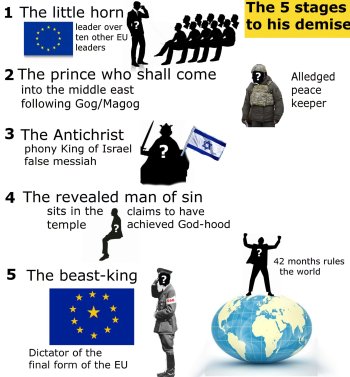In his second letter to the Thessalonians the apostle Paul shows that two circumstances must precede the return of our Lord: (1) a great falling away from the original, apostolic faith; and (2) the appearance of the Man of Sin, the antichrist (2 Thess. 2:3). No interpretation of our Lord's second advent should be seriously considered which fails to identify these two events. Having proven that our Lord has already returned, we now proceed to show that the Man of Sin has indeed come, fulfilling every detail of the prophetic description.
Let us first note, however, the disharmony between this prophecy and some current views. Some claim that the Lord Jesus first comes secretly to take his saints—and then the Man of Sin appears. An examination of an error made in the early church is instructive on this point. Recognizing that Christ was to come invisibly, as a thief (1 Thess. 5:4, Rev. 16:15), some believers in Paul's day concluded that Jesus was already present and that the resurrection of the dead in Christ had, therefore, occurred (2 Thess. 2:1-2, 2 Tim. 2:18). In order to correct this mistake, Paul found it necessary to advise that they "be not soon shaken in mind…that the day of the Lord is present [Greek, enistemi]. Let no man deceive you by any means; for that day shall not come, except there come a falling away first, and that man of sin be revealed, the son of perdition." 2 Thessalonians 2:2,3 Compare with the Revised Standard Version. Notice, the invisible presence of Christ is preceded, not followed, by the revealment of the Antichrist. Also verses 1 and 3 teach that the Man of Sin precedes two things: (1) "The coming of our Lord"; and (2) "our gathering together unto him." This eliminates the possibility of Christians being taken to heaven before the Man of Sin is revealed.
It should be observed further, that Paul did not attempt to correct their error by asking if they had seen Jesus with their literal eyes, or had heard a literal trumpet with their ears, or had seen large numbers of Christians suddenly disappear. Had such arguments been appropriate, Paul would certainly have employed them. The concept of the invisible presence was correct: the Day of the Lord would steal quietly upon the world and many would be overtaken by it unawares (1 Thess. 5:2-4). The mistake of believers in that day was not in regard to what they should expect, but when. Looking forward with great eagerness to the return of Christ, as the fruition of all their hopes, they were prone to accept uncritically any teaching to the effect that their longed for Lord was present, or near at hand.
Let us first note, however, the disharmony between this prophecy and some current views. Some claim that the Lord Jesus first comes secretly to take his saints—and then the Man of Sin appears. An examination of an error made in the early church is instructive on this point. Recognizing that Christ was to come invisibly, as a thief (1 Thess. 5:4, Rev. 16:15), some believers in Paul's day concluded that Jesus was already present and that the resurrection of the dead in Christ had, therefore, occurred (2 Thess. 2:1-2, 2 Tim. 2:18). In order to correct this mistake, Paul found it necessary to advise that they "be not soon shaken in mind…that the day of the Lord is present [Greek, enistemi]. Let no man deceive you by any means; for that day shall not come, except there come a falling away first, and that man of sin be revealed, the son of perdition." 2 Thessalonians 2:2,3 Compare with the Revised Standard Version. Notice, the invisible presence of Christ is preceded, not followed, by the revealment of the Antichrist. Also verses 1 and 3 teach that the Man of Sin precedes two things: (1) "The coming of our Lord"; and (2) "our gathering together unto him." This eliminates the possibility of Christians being taken to heaven before the Man of Sin is revealed.
It should be observed further, that Paul did not attempt to correct their error by asking if they had seen Jesus with their literal eyes, or had heard a literal trumpet with their ears, or had seen large numbers of Christians suddenly disappear. Had such arguments been appropriate, Paul would certainly have employed them. The concept of the invisible presence was correct: the Day of the Lord would steal quietly upon the world and many would be overtaken by it unawares (1 Thess. 5:2-4). The mistake of believers in that day was not in regard to what they should expect, but when. Looking forward with great eagerness to the return of Christ, as the fruition of all their hopes, they were prone to accept uncritically any teaching to the effect that their longed for Lord was present, or near at hand.
Last edited:


